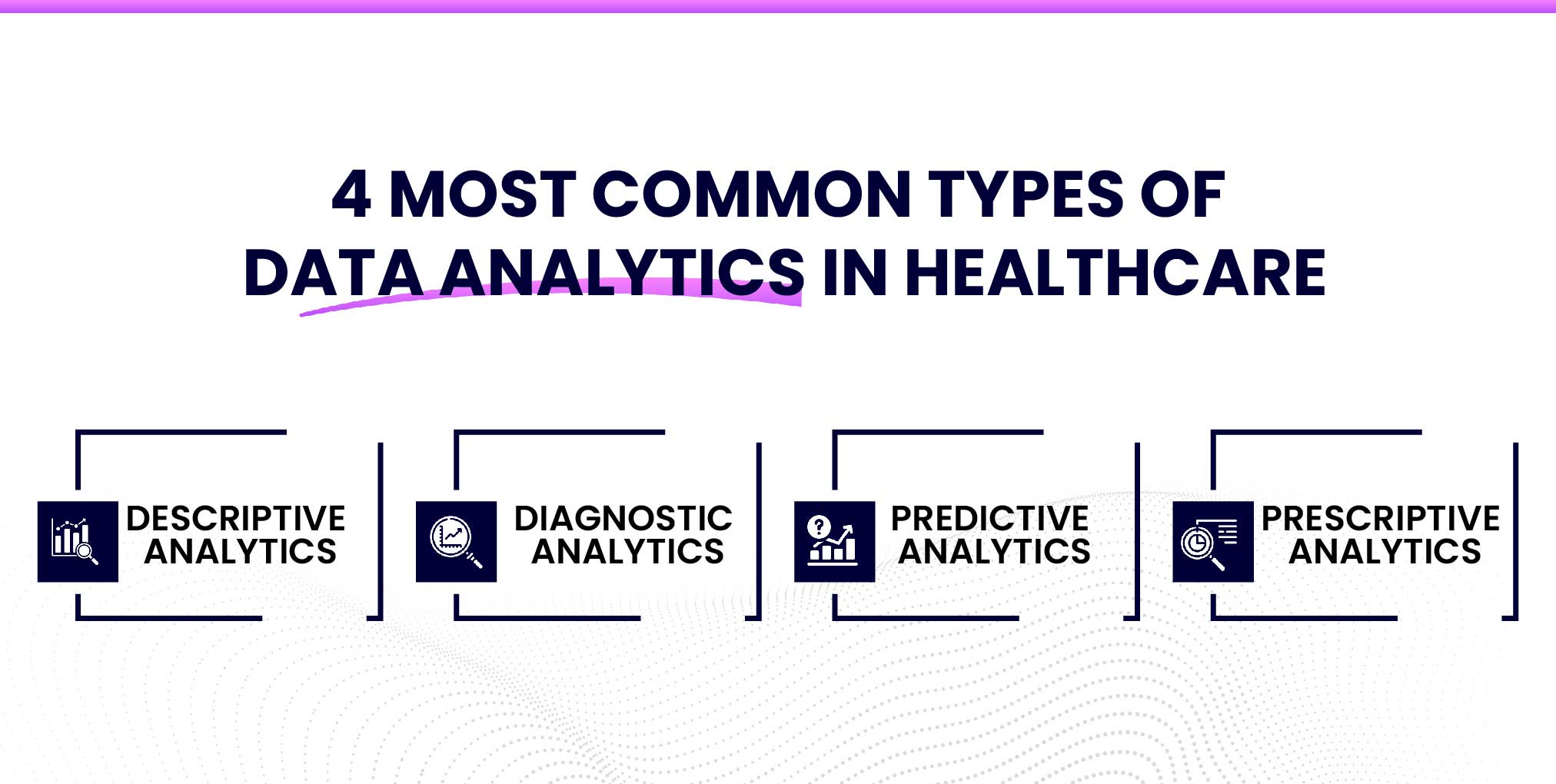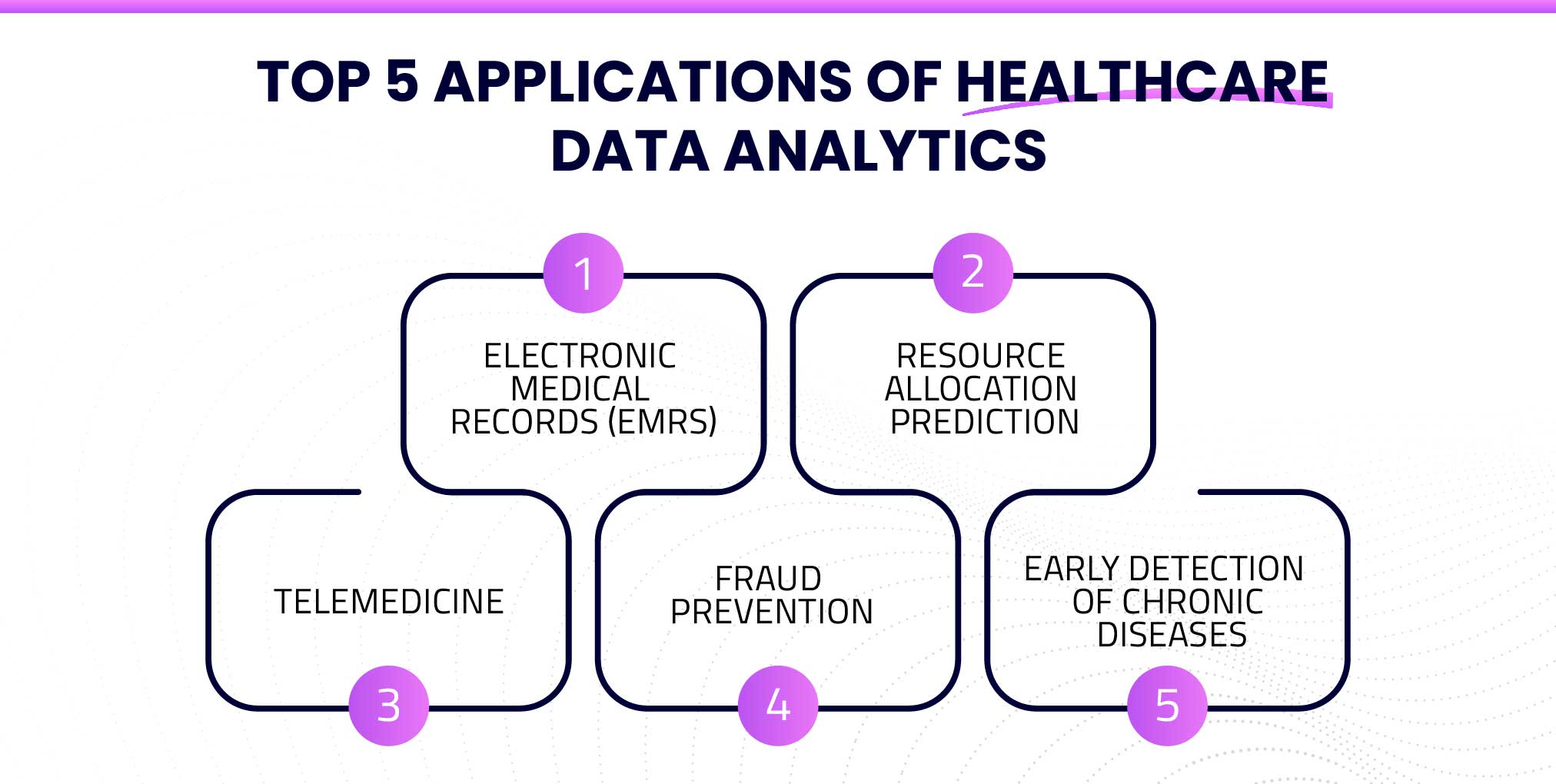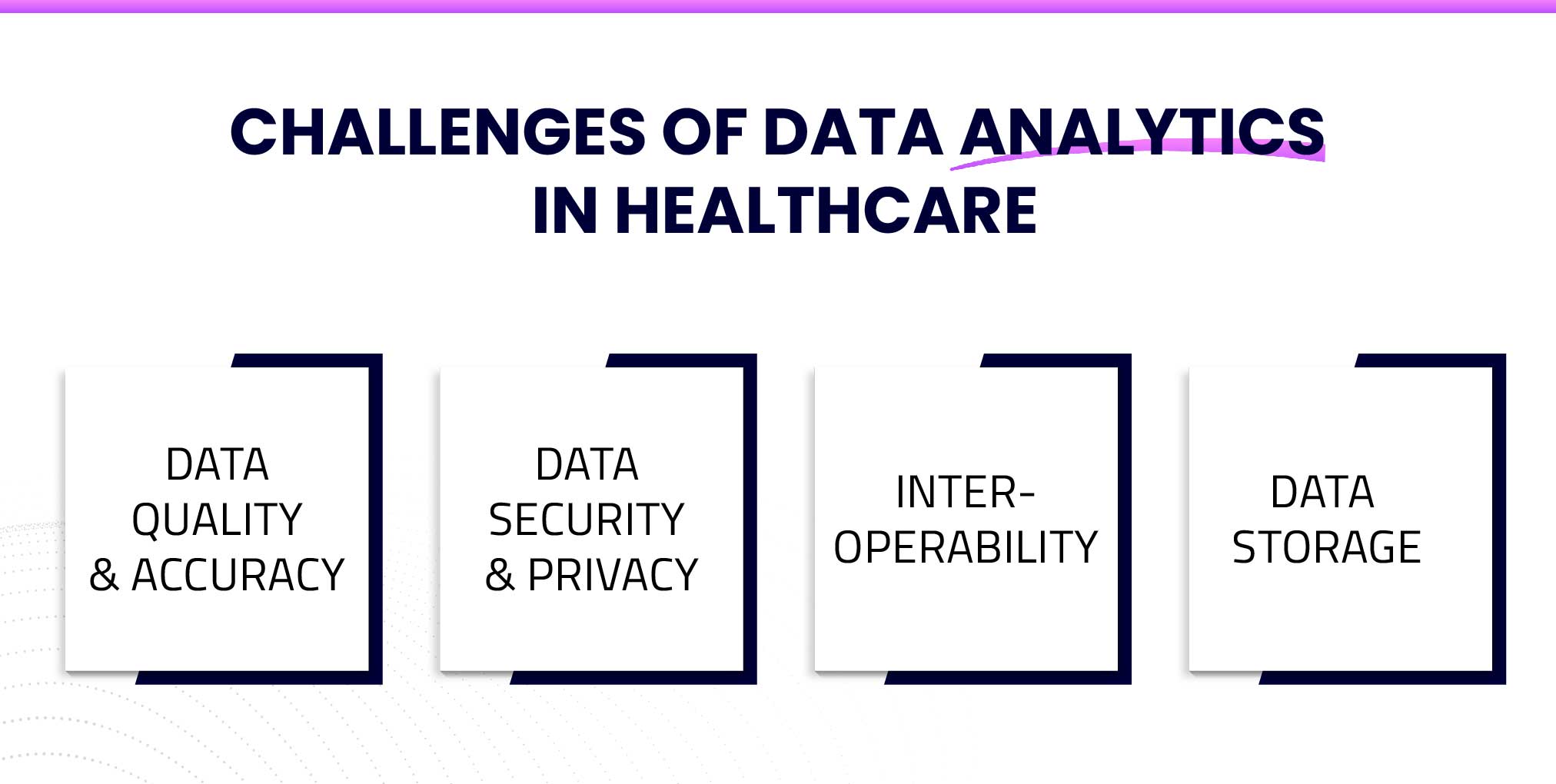

June 25, 2024
Healthcare organizations deal with massive amounts of data, and insights from these data sets can lead to better and smarter healthcare. However, the question to consider is: How can you get invaluable insights from medical data?
The answer lies in the intersection of data science and advanced technology. Healthcare data analytics solutions result from this interaction. These solutions help professionals to gain meaningful insights to improve health outcomes.
Among the many benefits of data analytics in healthcare, this is a major reason why organizations are investing heavily in these solutions. According to Precedence Research, the global healthcare analytics market was $37.15 billion in 2022 and will be worth $121.1 billion by 2030.
In this article, we’ll explore the top applications, benefits, and challenges of data analytics solutions in healthcare.

Healthcare analytics is analyzing and turning raw healthcare data into actionable insights. This data can come from electronic medical records (EMRs), HIMS systems, etc. These insights help healthcare organizations stay agile and make data-driven decisions. It leads to improved operational efficiency and better patient outcomes.
By now, we have mentioned about improving outcomes twice. Intriguing minds must be pondering how it is possible. The simple answer is through early detection of diseases and offering personalized treatments based on genetic and medical insights.
We will delve deeper into the importance of big data analytics in healthcare when discussing its benefits. But before that, without wasting much time, let’s discuss the types of healthcare data analytics.

There are four types of healthcare data analytics available that are used to understand healthcare data effectively. These include:
Descriptive analytics is the process of understanding past events or identifying trends using historical data. For example, it provides information on how many patients were treated in the past month and answers questions about hospital resource utilization. It serves as a base for other types of data analytics to forecast future events.
Diagnostic analytics is the process of determining why something happened in the past by uncovering root causes. For example, this type of healthcare analytics answers questions like “Why did this occur?” or “Investigating why certain treatments were more effective than others for specific patient groups.” It helps to pinpoint the reasons and empower healthcare providers to make informed decisions.
Predictive modeling is the process of predicting future health events based on historical data. For example, caregivers can predict which patients are more likely to be at risk for developing diseases such as diabetes or forecast which patients are likely to be readmitted to the hospital. Predictive analytics make it possible with the help of machine learning and statistical algorithms.
Prescriptive analytics goes one step further than predictive analytics. It isn’t just about predicting future outcomes but about providing suitable recommendations to achieve desired outcomes. It allows caregivers to offer the care that patients deserve and utilize resources optimally. For example, it suggests methods to minimize costs without compromising patient care or recommends the most effective treatment plans.

Healthcare analytics solutions can empower you to address your most pressing healthcare challenges. Here are the top 5 applications of data analytics in healthcare that emphasize why you need to invest in it:
According to Statista, the healthcare industry generated 2314 exabytes of data annually by the year 2020. This data may include patient medical reports, treatment history, laboratory reports, etc. Electronic medical records are one of the biggest applications of big data analytics in healthcare that uses these scattered data by storing them in a single place.
EHR and EMR software solutions store and manage comprehensive healthcare information digitally. They make it easier for professionals to access and share patient data between different healthcare providers for delivering coordinated care.
One of the biggest use cases of healthcare data analytics is overcoming the challenges of resource allocation. Inefficient resource allocation can result in a huge amount of money loss that no organization can afford.
Data analytics in healthcare allows organizations to manage not only their supplies or equipment efficiently but also their staff. Insights from data allow healthcare providers to gain information about demand patterns to meet them efficiently.
Healthcare data analytics solutions aid in delivering high-quality care to patients remotely. We all know that during COVID-19 the adoption of telemedicine solutions has increased. These solutions are used for initial diagnosis or remote patient monitoring. However, there is a need for solutions that analyze accurate patient data in real-time.
Big data in healthcare analytics allows professionals to gain insights from data received from various sources, including wearable technologies, EHRs, EMRs, etc. It enables caregivers to raise the standards of healthcare service delivery by making better decisions. Moreover, effectively utilizing data can reduce the patient readmission rate by offering them personalized medication.
Fraud is one of the biggest challenges that every industry faces. Healthcare is no exception. According to an FBI report, healthcare fraud causes tens of billions of dollars in losses each year.
Healthcare data analytics using advanced machine learning algorithms allows professionals to analyze data and identify any suspicious transactions. It helps to detect and prevent fraud from happening and saves a hefty amount of money annually.
One of the most promising applications of healthcare data analytics is the early detection of chronic diseases. A huge amount of patient data from various sources is used to identify patterns and indicators that may signal the onset of chronic conditions such as diabetes and cancer.
Caregivers can use these insights to provide preventative medicine to high-risk individuals. This approach can reduce hospital admissions.
The healthcare industry is constantly transforming. Healthcare data analytics solutions are at the heart of this transformation. They offer numerous advantages to businesses of all sizes, whether small or Fortune 500 organizations. These benefits include:
One of the major benefits of using big data in healthcare smartly is accurate and quicker disease diagnosis.
Artificial intelligence and machine learning algorithms identify trends and anomalies in patient data. They alert caregivers about any potential health risks and empower them to intervene in a timely manner to provide necessary care. The use of healthcare analytics solutions can save countless lives.
Healthcare data analytics solutions play a pivotal role in enhancing patient outcomes. They do so by providing comprehensive insights from patient big data in healthcare.
These insights empower healthcare professionals to offer preventive care and personalized medication to individual patients. It not only improves patient care but also their satisfaction and trust in the provider’s organization.
Mentioning the benefits of data analytics in healthcare and excluding better operational efficiency is nothing less than a crime. Healthcare analytics allows healthcare organizations to identify inefficiencies in their processes.
Healthcare data analytics solutions make it easier for providers to efficiently allocate resources such as staff, equipment, and facilities. They do so based on usage patterns and future demand predictions. But that’s not all. These solutions also streamline healthcare operations by addressing loopholes, thus enhancing healthcare delivery standards.
We all know how long it takes to introduce a reliable drug in the market. There was a dire need for innovative solutions and technology that could aid in quickly introducing new therapies and drugs.
Big data analytics in healthcare plays a crucial role in accelerating the process of new drug discovery and development. It helps researchers utilize large data sets within a fraction of the time to their maximum potential by identifying trends and patterns in them. This not only speeds up the research process but also helps in developing more effective drugs that can save hundreds of thousands of lives.
Data analytics tools in healthcare empower insurance companies and healthcare organizations to combat fraud. These tools analyze vast amounts of billing data and identify any suspicious transactions or irregularities in patterns to flag them for further investigation. The Centers for Medicare and Medicaid Services (CMS) saved over $210.7 million by preventing fraud in just a year using data analytics tools.
Moreover, big data analysis in healthcare allows healthcare practitioners to know the areas where they can cut costs. Another way in which healthcare data analytics solutions help you remain cost-effective is by predicting the medical supplies demand in hospitals.

There are many benefits of data analytics in healthcare as it not only enhances operational efficiency but also drives medical research. But, like always, there are two sides to a coin. There are also some challenges that you have to navigate through. Here are some of the challenges of healthcare data analytics:
When it comes to healthcare analytics, the data itself originates from a variety of sources. These include electronic health records (EHRs), laboratory tests, medical imaging, and patient data, such as heart rate, sleep patterns, and calories burned, collected from wearable devices.
This diversity can sometimes lead to incomplete data, data entry issues, or outdated data. It ultimately results in incorrect conclusions that can negatively affect patient care.
To improve data quality, healthcare providers can benefit from prioritizing the valuable data types and data governance. They can also implement the Clinical Documentation Improvement (CDI) program, where data can be reviewed for any inconsistencies. It thereby ensures data accuracy and completeness.
While living in this digital age provides a wide array of benefits, it also comes with a high risk of cyberattacks, and the healthcare industry is no different. Owing to the sensitive data, it is a prime target for cyber attackers. Ultimately, these data breaches and cyber security issues can result not only in legal penalties but also in the loss of patients’ trust.
There is a need to implement comprehensive security measures like advanced encryption, a strong firewall, and intrusion detection systems to improve data security in the healthcare sector.
Moreover, to ensure the privacy and security of big data in healthcare, it is recommended to conduct frequent security audits that can help find and resolve potential vulnerabilities in the system. Thus, implementing these security measures can help mitigate the chances of these cyberattacks.
Interoperability is the seamless exchange of data between different healthcare systems and software applications. In the healthcare sector, the lack of interoperability between different systems can hinder patient care.
There are national initiatives like the Trusted Exchange Framework and Common Agreement (TEFCA) that can help improve the data exchange nationwide.
Moreover, to further resolve the interoperability challenge of data analytics in healthcare solutions, it is recommended that standards like Fast Healthcare Interoperability Resources (FHIR) be adopted. This standard provides faster and real-time access to quality data and improves interoperability.
It is no hidden fact that the data in the healthcare sector is growing exponentially. While on-premise storage solutions provide you with control, they are often expensive and prone to data silos.
On the other hand, if we talk about cloud storage, while it provides you with high scalability and disaster recovery options at the same time, not only is it prone to cyber attacks, but it also requires strict compliance with regulations like the Health Insurance Portability and Accountability Act (HIPAA).
It is recommended that a balanced hybrid approach be opted for, leveraging both on-premise and cloud storage to help mitigate the data storage issues. This approach can help achieve a balance between control and scalability. Moreover, to secure sensitive patients’ data, it is recommended that strong encryption methods comply with the regulations be used.
Healthcare data analytics solutions coupled with AI can reinvent the healthcare industry. They offer in-depth insights that empower professionals to make informed decisions for delivering high-quality, personalized care to patients. The introduction of these solutions is shifting the approach to care from reactive to proactive.
We can confidently say that as technology continues to evolve, the impact of big data analytics in healthcare will be more lasting and directly enhance the quality of healthcare services. It is time for organizations to shift towards delivering smarter healthcare by investing in healthcare analytics.
Healthcare organizations are investing in innovative healthcare solutions to take the lead over competitors. If you want your organization to stay relevant in this highly competitive landscape, you must make the necessary investments. It is recommended to partner with a reliable AI healthcare development company to realize the benefits of healthcare analytics solutions fully.
Xeven Solutions is a leading healthcare software development company that has a proven track record of delivering secure and HIPAA-compliant solutions. These solutions enable you to deliver care to your patients effectively without losing human empathy. Get in touch with our healthcare consultants today to understand your shortcomings and overcome them efficiently.